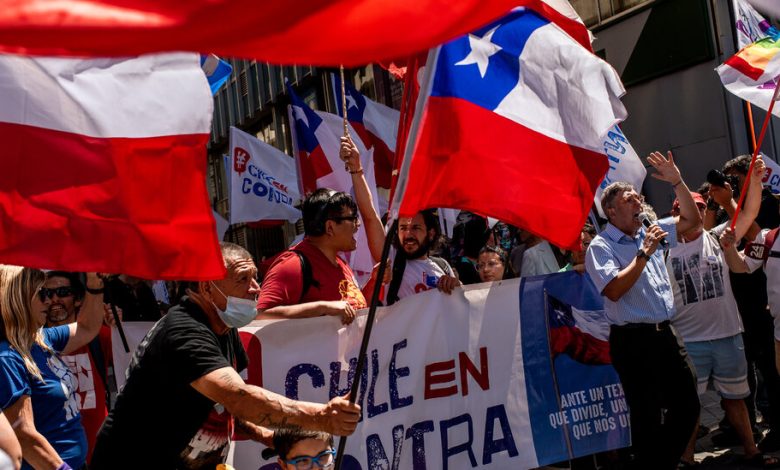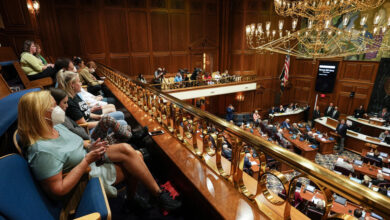Chile’s Left Forced a New Constitution. Then the Right Took Control.

In 2019, a police officer fired rubber bullets toward a psychology student named Gustavo Gatica, just one of the thousands of protesters demonstrating across Chile against the nation’s government and deep inequality. Mr. Gatica lost one eye and was blinded in the other.
Mr. Gatica considered it a devastating sacrifice, but not one made in vain. The protests forced a process to scrap the Chilean Constitution, which still had roots in the nation’s bloody 17-year military dictatorship, and write a national charter from scratch. Mr. Gatica became part of a national campaign for a new, hopeful path forward for this South American nation of 19 million.
Now, four years later, after a series of bruising political battles and votes in constitutional assemblies and on drafts, Mr. Gatica finds himself in a disorienting position. On Sunday, he is planning to vote to keep the dictatorship-era Constitution that he lost his vision fighting to replace.
The reason? The proposed charter Chileans are deciding on would actually pull the nation more to the right.
“Unexpectedly, they managed to write an even worse constitution,” said Mr. Gatica, 26, sitting in the psychology practice he started in Santiago, Chile’s capital, a few blocks from where he was blinded. “In 2019, I never would have thought we’d be at this point.”
Chile’s vote is the culmination of a four-year undertaking to adopt a new constitution that at one point was hailed as a model for democratic governance across the world — and is now an illustration of how messy democracy truly is.
There were the enormous protests, first prompted over a 4-cent rise in subway fares, that left parts of Santiago destroyed, more than 30 civilians dead and 460 protesters with severe eye trauma.
There was a national referendum — with 78 percent voting in favor — to replace the current Constitution, a heavily amended version of a 1980 document first enacted by the military government of Gen. Augusto Pinochet.
There was then a constitutional assembly made up of political outsiders, mostly from the left and far left, who drafted a 388-article text that would have enshrined more than 100 rights, the most of any national charter in history, including the right to housing, education, internet access, clean air, sanitation and care “from birth to death.”
There was the overwhelming rejection of that text last year in a national plebiscite.
And finally, this year, the election of a new constitutional assembly, now largely led by a far-right party, that drafted an entirely new charter that critics say would harden the economic conditions that the protesters had fought against and that started the whole process.
“It’s been our turbulent way of coming to terms with the unfinished work of the transition to democracy,” said Felipe Agüero, a University of Chile political scientist who has studied the country’s evolution since the end of the Pinochet dictatorship in 1990.
Both the left and the right, when given the chance to finally write a new charter, shunned compromise and instead wrote texts almost completely based on their worldview, he said. “It’s a consequence of postponing changing the Constitution in a significant way for so long,” Mr. Agüero said.
Last year, Chileans came out in droves to support or fight against the proposed charter in a moment that felt momentous for the country.
Days before the vote, hundreds of thousands of people supporting the left-leaning text engulfed downtown Santiago, the sight of the tense protests years earlier, for a concert to close the campaign of what they hoped would be the start of a new, more equal nation.
Then 62 percent of Chileans rejected the proposal. The left was deflated, and much of the public became disillusioned and disengaged.
Months later, right-wing candidates won two-thirds of the 51 seats in a new constitutional council. Many were members of Chile’s surging far-right Republican Party, which generally opposes abortion and same-sex marriage and speaks nostalgically about the Pinochet years.
As part of the second constitutional process this year, Congress appointed a group of 24 experts, most of them lawyers, who drafted a model text that presented a common-ground approach.
“I felt we could all live with it,” Michelle Bachelet, Chile’s center-left former president, said in an interview. Instead, the right-wing dominated council significantly expanded on the model to create a more conservative text. “The temptation for them was too big,” she said.
“You can’t win everything or gain everything,” Ms. Bachelet added. “That’s what happened with the first attempt, and that’s what’s happening now.”
Luis Silva, a Republican Party member of the council who has emerged as its spokesman of sorts, has said that the process was actually balanced because both the left and right agreed on the parameters, there was an equal number of women and men involved and the model text from the bipartisan group of experts heavily influenced the final proposal.
“I am convinced that the proposal is a balance between the views of the left and the right regarding all constitutional issues,” he said in a televised debate this month.
The 216-article text sets out a wide range of rules and principles — the U.S. Constitution has seven articles, by comparison — but how they would be enacted into laws is unclear.
The text supports a pro-market approach to governing, ensuring the private sector a prime role in areas like education and health. It appears to lock Chile into a private social security system that has been widely criticized for providing meager pensions, as well as an insurance-based health care system that often makes treatment more expensive for women, older people and people with preexisting conditions.
The text also includes nods to the deeply held religious beliefs of some of its authors. (Mr. Silva, for instance, lives in a house specifically for followers of Opus Dei, a strict Catholic group whose members are often celibate.)
Language in the proposed text could lead to laws that give institutions the right to be so-called conscientious objectors, meaning health clinics could refuse to perform abortions and businesses could theoretically invoke their religious beliefs to decline services to certain groups, such as gay couples or transgender people.
Mr. Silva has said that he opposes abortion, but that the Constitution was not the place to litigate that.
Yet the provision that has received the most attention by far is a one-word tweak to the current Constitution’s language on the right to life. The proposed draft refers to the protection of the life of “who is to be born,” instead of “that is to be born” in the current charter.
Many Chileans are concerned that this change could enable the courts to strike down Chile’s law that allows for abortion in certain circumstances.
Polls have suggested for months that Chileans would reject the proposed text, though the margin has narrowed recently. Politicians and the Chilean government have said that if rejected, they would scrap the idea of writing a new constitution, at least for now.
If it is rejected, it would be highly unusual. Before Chile’s plebiscite last year, voters had approved 94 percent of the 179 full constitutional referendums worldwide since 1789, according to research by Zachary Elkins and Alex Hudson, two American political scientists.
In two years, Chile could tally just the 12th and 13th rejections of a new constitution in modern history, according to their analysis.
Mr. Gatica, who has started a rock band with seven other protesters who lost eyes in the 2019 demonstrations, said that regardless of the outcome on Sunday, Chile will not have achieved the future he had hoped for.
“It’s disappointing, but I understand that social processes are like this,” he said. “I at least won’t give up on continuing to demand that things change.”
Pascale Bonnefoy contributed reporting.




